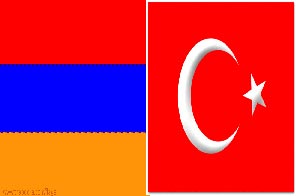Turkey, Armenia deals delayed
ZURICH: A landmark move by Turkey and Armenia to sign bilateral deals aimed at normalising their ties after almost a century of bitterness was delayed Saturday amid a "last minute hitch" with the Armenians.
Armenian Foreign Minister Edouard Nalbandian and his Turkish counterpart Ahmet Davutoglu had been due to sign the two protocols in a ceremony at the University in Zurich early this evening.
But US State Department spokesman Ian Kelly told reporters that the ceremony was delayed after "a last minute hitch" with the Armenians, touching off frenetic scenes in the northeastern Swiss city.
Over an hour-and-a-half after the scheduled ceremony, the Armenian foreign minister and US Secretary of State Hillary Clinton had still not arrived at the University where the signing is due to take place.
Together with EU foreign affairs chief Javier Solana, Russian Foreign Minister Sergei Lavrov, French Foreign Minister Bernard Kouchner, Clinton was aiming to provide a public show of support for the Turkish-Armenian deal.
Swiss officials said Solana, Lavrov, Kouchner, Davutoglu, and Swiss Foreign Minister Micheline Calmy-Rey, representing the mediators, have all arrived at the university.
An AFP reporter said a convoy with Clinton had turned around while travelling there from a luxury hotel where she had earlier held bilateral talks with the Turkish and Armenian ministers.
US Assistant Secretary of State for European and Eurasian affairs Phil Gordon was meeting Nalbandian in a hotel to try to deal with Armenian concerns about some of the statements to be made during the ceremony, officials said.
Gordon was also talking to the Turkish delegation by phone, they added, while Clinton consulted her diplomats in a limousine parked outside the hotel
Relations between NATO member Turkey and Russian-backed Armenia have been soured since the World War I massacres of Armenians under Ottoman rule.
The bridge-building by the two governments after more than a year of discrete Swiss-mediated talks is still hampered by fierce opposition at home, as well as within the influential Armenian community abroad.
A senior State Department official underlined that US President Barack Obama had played a key role in encouraging both sides, as well as nearby Azerbaijan, to normalise ties and reduce the risk of conflict in the region.
The two protocols Nalbandian and Davutoglu are due to sign would establish diplomatic ties and open the Armenian-Turkish border, provided their respective parliaments subsequently ratify them.
Observers say official reconciliation could allow landlocked Armenia to gain a much-needed economic boost.
Although the Turkish and Armenian governments can command parliamentary majorities, the domestic climate is preventing them rushing ahead with ratification by lawmakers.
Armenian President Serzh Sarkisian said in a nationwide address Saturday that Armenia has "no alternative to establishing ties with Turkey without preconditions."
Up to 10,000 people took to the streets of the Armenian capital Yerevan on Friday to protest against the creation, under the deal with Turkey, of a commission to study the Ottoman-era massacres of Armenians.
Critics believe the step calls into question Armenian claims of genocide in 1915-1917, when they say 1.5 million of their kinsmen were systematically killed by Ottoman Turks.
Turkey denies the claims and says the death toll is inflated, having shunned diplomatic ties over Yerevan's campaign to have the killings recognised internationally as genocide.
Another long-running dispute over Nagorny-Karabakh -- an Armenian-majority enclave which broke free from Azerbaijan after a war in the early 1990s -- is also weighing on reconciliation efforts.
Turkey closed its border with Armenia in 1993 to support Azerbaijan and the Turkish government has been accused at home of making concessions that would sell out Azerbaijan.
But Sarkisian reiterated Saturday that Armenia rejected any link between the normalisation with Turkey and the Nagorny Karabakh dispute.






